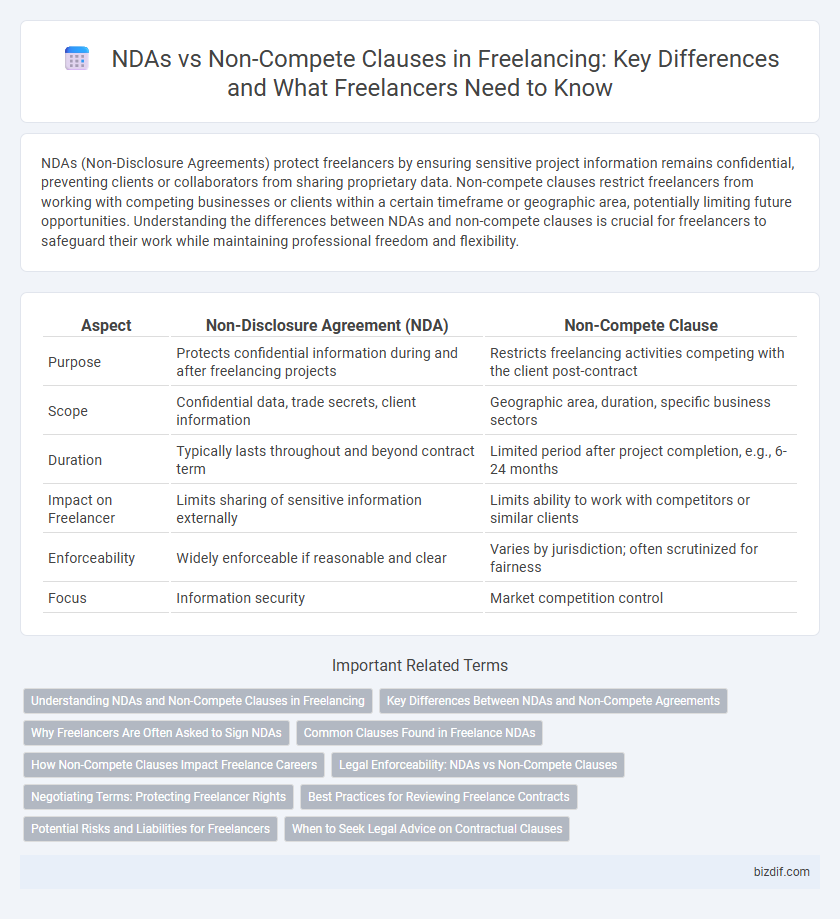NDAs (Non-Disclosure Agreements) protect freelancers by ensuring sensitive project information remains confidential, preventing clients or collaborators from sharing proprietary data. Non-compete clauses restrict freelancers from working with competing businesses or clients within a certain timeframe or geographic area, potentially limiting future opportunities. Understanding the differences between NDAs and non-compete clauses is crucial for freelancers to safeguard their work while maintaining professional freedom and flexibility.
Table of Comparison
| Aspect | Non-Disclosure Agreement (NDA) | Non-Compete Clause |
|---|---|---|
| Purpose | Protects confidential information during and after freelancing projects | Restricts freelancing activities competing with the client post-contract |
| Scope | Confidential data, trade secrets, client information | Geographic area, duration, specific business sectors |
| Duration | Typically lasts throughout and beyond contract term | Limited period after project completion, e.g., 6-24 months |
| Impact on Freelancer | Limits sharing of sensitive information externally | Limits ability to work with competitors or similar clients |
| Enforceability | Widely enforceable if reasonable and clear | Varies by jurisdiction; often scrutinized for fairness |
| Focus | Information security | Market competition control |
Understanding NDAs and Non-Compete Clauses in Freelancing
NDAs (Non-Disclosure Agreements) in freelancing protect sensitive client information by legally prohibiting freelancers from sharing proprietary data or trade secrets. Non-compete clauses restrict freelancers from working with competing businesses or clients within a specified timeframe and geographical area, potentially limiting future job opportunities. Understanding the distinct purposes and legal implications of NDAs and non-compete clauses helps freelancers safeguard client trust while maintaining career flexibility.
Key Differences Between NDAs and Non-Compete Agreements
NDAs (Non-Disclosure Agreements) protect sensitive information by legally binding freelancers to confidentiality, preventing the sharing of proprietary data with third parties. Non-Compete Clauses restrict freelancers from engaging in similar business or working with direct competitors within a specified geographic area and time frame. While NDAs focus on secrecy and information protection, Non-Compete Agreements limit competitive activities to safeguard the client's market position.
Why Freelancers Are Often Asked to Sign NDAs
Freelancers are often asked to sign NDAs to protect confidential information shared during projects, ensuring sensitive client data, proprietary methods, and trade secrets remain secure. NDAs legally bind freelancers from disclosing details to competitors or the public, safeguarding the client's competitive advantage. Unlike non-compete clauses, NDAs do not restrict future work opportunities but focus solely on maintaining confidentiality.
Common Clauses Found in Freelance NDAs
Freelance NDAs typically include clauses on confidentiality obligations, specifying the types of information considered confidential and the duration of secrecy. They often contain non-use provisions limiting freelancers from exploiting the client's proprietary information for personal gain. Unlike non-compete clauses, these NDAs focus solely on protecting sensitive data without restricting the freelancer's ability to work with competitors.
How Non-Compete Clauses Impact Freelance Careers
Non-compete clauses restrict freelancers from working with competing clients or industries for a defined period, limiting their market opportunities and income potential. These clauses can hinder skill diversification and reduce the ability to build a broad client base, essential for sustained freelance success. Understanding specific terms and negotiating limitations in non-compete agreements is critical to maintaining career flexibility and growth.
Legal Enforceability: NDAs vs Non-Compete Clauses
NDAs (Non-Disclosure Agreements) are generally more legally enforceable than Non-Compete Clauses, as courts prioritize protecting confidential information over restricting employment opportunities. Non-Compete Clauses face stricter scrutiny and often require limitations on duration, geography, and scope to be deemed enforceable. Freelancers should carefully review jurisdiction-specific laws since enforceability varies significantly between regions.
Negotiating Terms: Protecting Freelancer Rights
Negotiating NDAs and non-compete clauses requires freelancers to carefully balance confidentiality with future work opportunities, ensuring terms do not overly restrict their ability to accept new clients or projects. Clear definitions of scope, duration, and geographic limitations protect freelancers from unfair constraints while safeguarding client information. Freelancers should seek clauses that limit non-compete duration to a reasonable period and exclude unrelated industries to maintain career flexibility.
Best Practices for Reviewing Freelance Contracts
Careful examination of NDAs in freelance contracts ensures clear understanding of confidentiality obligations vital for protecting client information. Evaluating non-compete clauses helps freelancers identify potential limitations on future work opportunities within specific markets or industries. Prioritizing clarity on the scope, duration, and geographic restrictions in both NDAs and non-compete agreements minimizes legal risks and preserves professional flexibility.
Potential Risks and Liabilities for Freelancers
Freelancers face significant potential risks and liabilities when signing NDAs, including limitations on sharing work-related knowledge and reduced professional exposure, which can hinder future opportunities. Non-compete clauses impose restrictions on freelancers' ability to work with similar clients or industries, often leading to income loss and legal consequences if breached. Understanding the scope and enforceability of both NDAs and non-compete agreements is essential for freelancers to protect their business interests and avoid costly disputes.
When to Seek Legal Advice on Contractual Clauses
Freelancers should seek legal advice on NDAs and non-compete clauses when contract terms are ambiguous, overly restrictive, or potentially limiting future work opportunities. Understanding the scope, duration, and enforceability of these clauses can protect freelance careers and intellectual property. Consulting a legal expert ensures contracts align with industry standards and personal business goals.
NDAs (Non-Disclosure Agreements) vs Non-Compete Clauses Infographic

 bizdif.com
bizdif.com